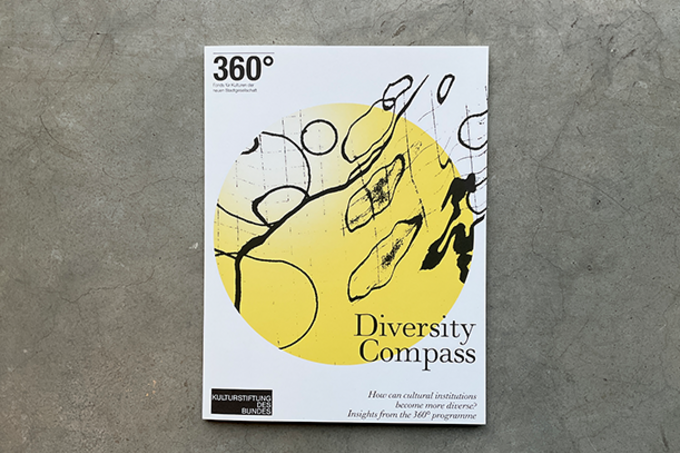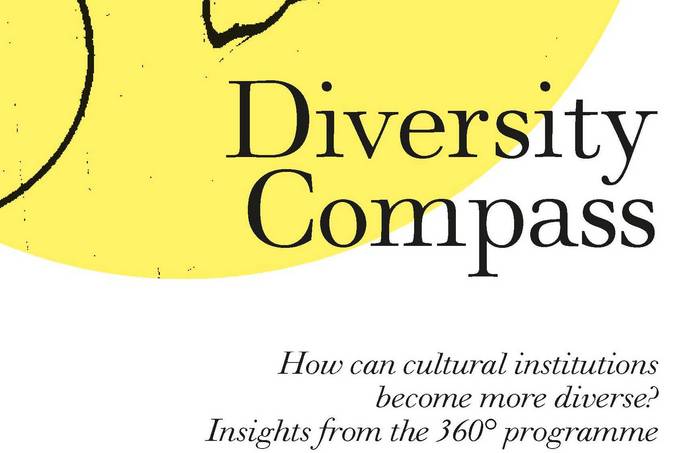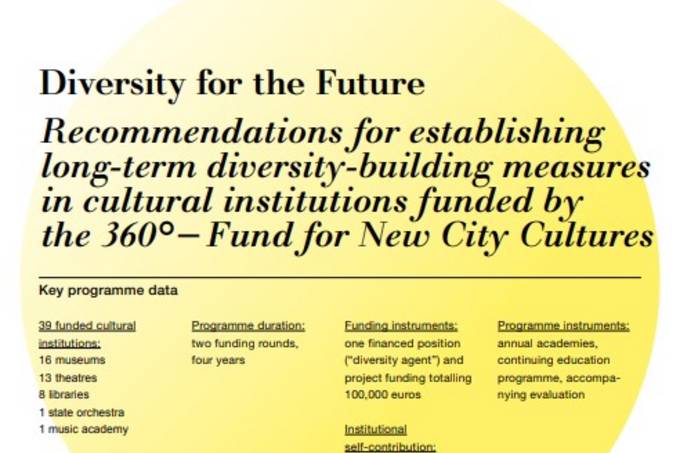Introduction to the fund
Migration has shaped German society in the past and will continue to do so in the future. Germany is a country of immigration, and its cities are strongly influenced by social diversity. Although many institutions are now actively shaping this new urban society, cultural organisations have been slow to address the cultural diversity of their cities in their programmes, personnel decisions and target audiences. Neither their managerial staff nor their visitors correspond to the proportion of the general population which has an immigrant background.
With its programme 360° – Fund for New City Cultures, the Federal Cultural Foundation wishes to encourage institutions in the areas of the fine and performing arts, music, literature, architecture, New Media and related forms, as well as cross-genre institutions, cultural- and art-historical museums, which address contemporary issues in their related field, to take a perspective that encompasses all of society. The aim is to actively integrate the controversial, but promising issues of immigration and cultural diversity into these institutions and their city cultures, and thereby reduce infrastructural exclusion in the cultural sector. The funding programme will support a broad range of approaches, strategies and methods which demonstrate in an exemplary manner how institutions can effectively participate in shaping urban society in the future in terms of thematic focus and staff appointments.
The German Federal Cultural Foundation supports a total of 39 cultural institutions with around 17.3 million euros in the programme 360°. The institutions include 16 museums, 13 theatres, eight libraries, a music school and a symphony orchestra.
Fact-Box
- Programme
- 360° – Fund for New City Cultures
- Funding period
- 2018–2025
- Funded institutions
- 39
- Funding amount
- 17.3 million euros
What is funded?
Funding is awarded to promote diversity in cultural organisations in the area of programming, audience reach and staff appointments. As part of 360° – Fund for New City Cultures, the Federal Cultural Foundation will finance a position at the cultural institutions (a so-called “agent”) and provide additional project resources for supportive activities and formats. Cultural institutions which receive funding through the Federal Cultural Foundation are required to co-finance their projects with additional resources. Projects that exclusively present existing topics and content are not eligible for funding.
Agents
Over a four-year period and in cooperation with the institution, the Agent will develop recommendations and measures which can be implemented by the institutions to change and diversify their activities themselves and which contribute to shaping a self-confident, immigrant-friendly society, by which all of urban society can benefit. The Agents should possess diversity-related competence, experience in initiating interaction between cultural organisations and participants of immigrant background, and relevant language skills. Their task is to develop and guide the diversity-oriented process of change at their respective cultural institution.
Application process
There were two open application rounds in 2017 and 2018. Cultural institutions could apply with a detailed description of their starting situation in the city, their motivation and goals, as well as their plans on how they want to work with the agent. The selection was carried out by an independent jury and has been completed. No further application is currently possible.
Jury
The members of the jury were:
- Julia Hagenberg, Head of the Education Department at the Kunstsammlung Nordrhein-Westfalen, where she is responsible for programmes with refugees and cooperation with international welcome classes
- Prof. Dr. Claudia Lux, Honorary Professor at The Berlin School of Library and Information Science at Humboldt Universität zu Berlin and Project Director of the Qatar National Library in Doha
- Jürgen Maier, Managing Director at the Maxim Gorki Theatre Berlin
- Jagoda Marinić, founder and director of the Interkulturelles Zentrum in Heidelberg, with which the city strengthens the civic engagement of local migrant self-organisations
- Fatema Mian, journalist at Bayerischer Rundfunk - film author and specialist editor for culture, migration and cultural diversity
- Miriam Tscholl, director of the Bürgerbühne at the Staatsschauspiel Dresden, where she staged the production "Morgenland" with Arabic-speaking Dresdeners and initiator of the "Monday Café" as an open meeting place for over 150 refugees and Dresdeners every week



